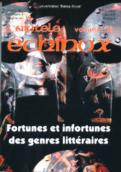Fortune et infortune du dialogue érotologique de l’Antiquité au XVIIIe siècle
Outcomes and misfortunes of the erotological dialogue from Antiquity to the 18th Century
Author(s): Jean-Pierre DubostSubject(s): Literary Texts
Published by: Universitatea Babeş-Bolyai
Keywords: Plato; Xenophon; Lucian; philosophical dialogue; erotics and dialogue; Ragionamenti; Aretino; Sade; Académie des dames; Philosophie dans le boudoir
Summary/Abstract: If the dialogue is a key genre of philosophical discourse since Plato, it was also, since its very beginning, doubled and undermined by its contrary – the erotic dialogue. Plato’s Symposion can thus be read on the one hand as a trial to conceptualize Eros, and on the other hand as the ontological fact that Eros withstands logos; Xenophon’s Symposion stresses even more the ambiguity of this unstable relationship between logos and Eros, especially in its theatrical conclusion. As a matter of fact, there is a mutual dependence between the dialogic tradition of philosophical dialogues about eros and the tendency of erotical dialogues to decontruct subversivly the philosophical discourse. Although Plato’s and Xenopho’s Symposia can be considered as prototypes, there is a long lasting tradition of dialogues about erotic topics, inextricably intertwined from antiquity to the end of the 18th Century. This paper suggests outlooks from an historical and methodological angle for the treatment of this “erotological” tradition from Plato to Sade.
Journal: Caietele Echinox
- Issue Year: 2009
- Issue No: 16
- Page Range: 307-316
- Page Count: 10
- Language: French
- Content File-PDF

